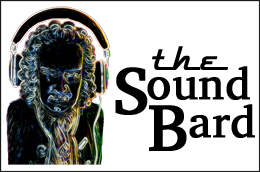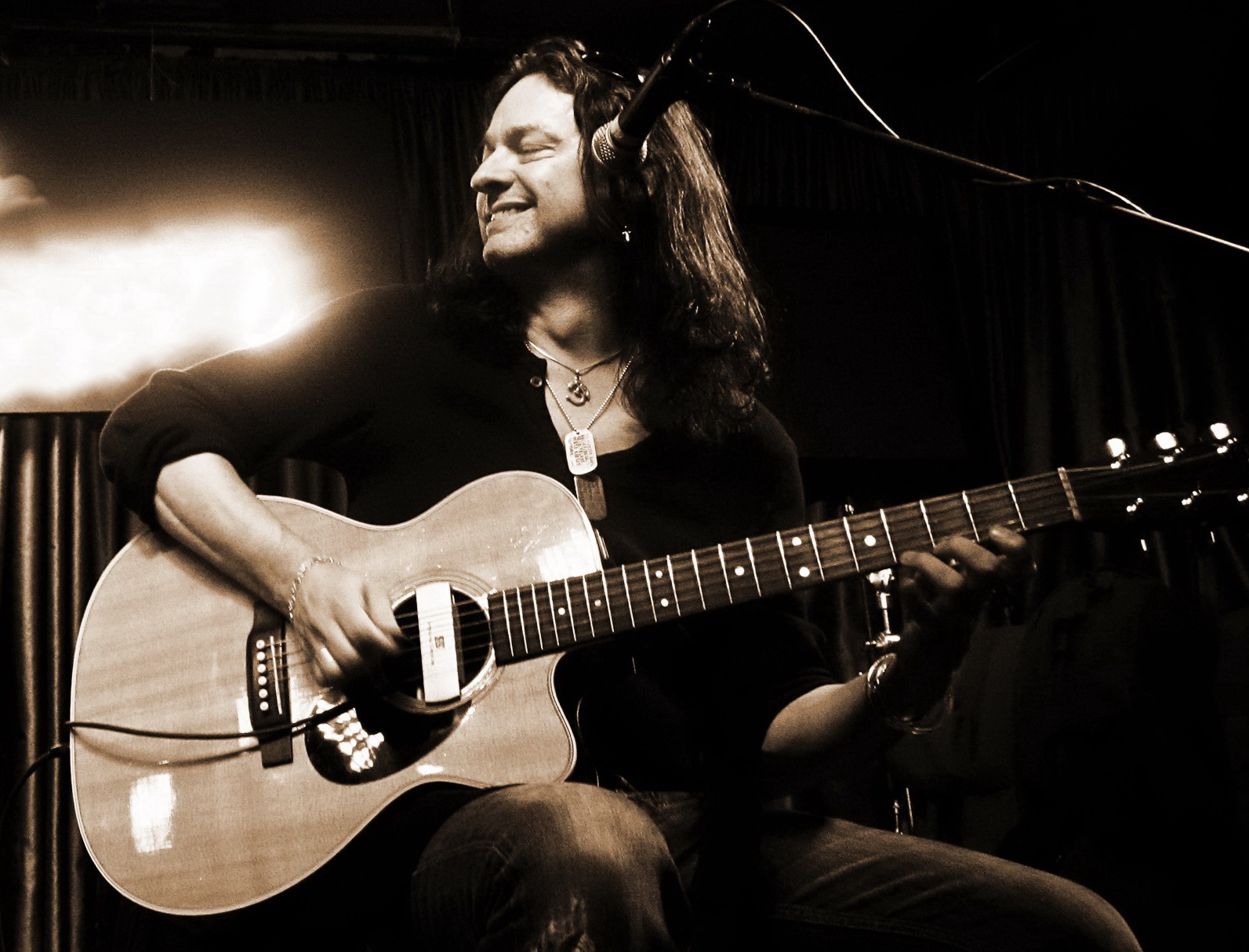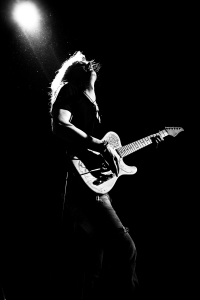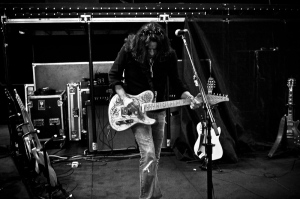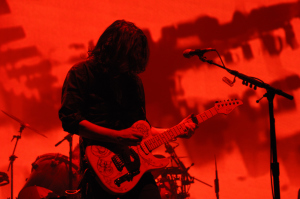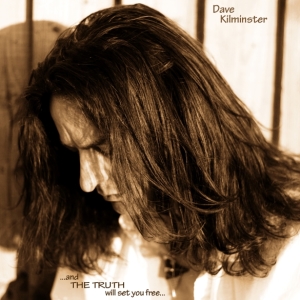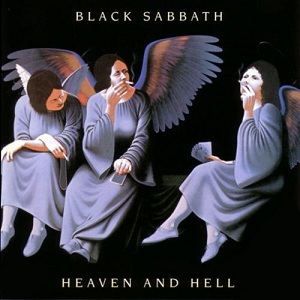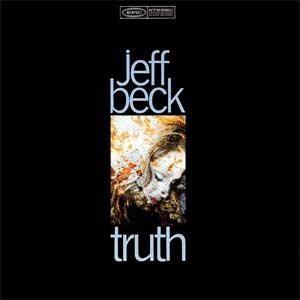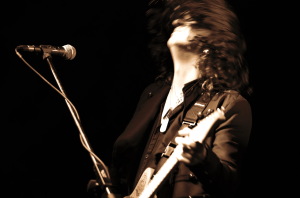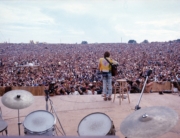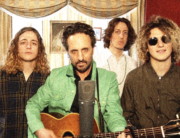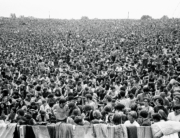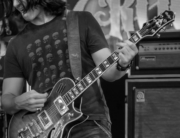BY MIKE METTLER — DECEMBER 24, 2014
“I don’t know why these songs all came out so long. I think we’re going to have to blame Steven Wilson,” laughs Dave Kilminster. The ace guitarist is discussing the impetus behind the extended track lengths on his self-described “prog-tastic” solo record, …and THE TRUTH will set you free… (Killer Guitar Records). Kilminster is known for his six-string pyrotechnics and prowess as an instructor, but you may also recognize him as being the featured lead guitarist in former Pink Floyd bassist/vocalist Roger Waters’ touring band for the past decade, the highlight being when he takes that big, iconic solo at the very apex of The Wall during “Comfortably Numb.” On THE TRUTH, Kilminster gets to spread his wings even further, as witnessed by the lengthy acoustic guitar intro to “Messiah” and the different movements and styles — including his intuitive interplay with a string quartet — on “Cassiopeia.” Getting a live feel is key, believes Kilminster: “It’s so cool to really get into the mood of a track,” he says. “There’s no sampling, there’s no Auto-Tune — just a couple of guys recording together in a room, the way it’s supposed to be.”
Here, Kilminster, 53, and I discuss vintage sounds, live quad, what it’s like to contend with immense pillows of wind while soloing atop a massive wall, and having a “special” backstage encounter with his guitar hero, Jeff Beck. That’ll keep you going through the show.
Mike Mettler: What was your idea for the character of how you wanted this album to sound? I like the many, varied layers to each song.
Dave Kilminster: Thank you. I like the “old” sounds. I like analog. I like valve mikes and old preamps. I just love the sound of ’70s records, really.
Mettler: THE TRUTH does have a bit of a timeless feel to it. It could have come out in the ’70s just as much as yesterday. Was that your intention when you were making it?
Kilminster: Yeah, it was. There is a little bit of a keyboard sample in there that’s kind of a mellotron thing, but it’s so sparse that you don’t really realize it; it’s just 2 or 3 seconds. I like to avoid keyboards in general, since I had a lot of keyboards on the previous album [2007’s Scarlet, later reissued in 2012 as Scarlet – The Director’s Cut]. I also didn’t want to use one of the whammy pedals, because that straightaway makes it sound like it’s from a certain period.
I just wanted to keep it as real as possible. All the backing tracks were the three of us [Kilminster, drummer Pete Riley, and bassist Phil Williams] in a room together. When I did all the guitar overdubs, the solos, I did them all in the “live” room, which is the way it’s supposed to be. (chuckles) Nowadays, a lot of people are tracking their guitar solos in the control room, and I’m like, “What are you doing in there?”
Mettler: Yeah, in the early days of the rock era, artists were forbidden to be in the control room at all, and now a lot of people go in there and plug in DI. I like to get the sense of people playing together. You three guys have put a lot of years in together, and I want that feeling of interactivity captured on record.
Kilminster: Exactly, exactly. And that’s the sound I was going for — ’70s records. There was also some great stuff in the ’80s and the ’90s — I mean, [Jeff Buckley’s] Grace (1996) is such an amazing-sounding album. He’s my favorite singer of all time. And that’s the guy who used to work on the Led Zeppelin records as well [Glyn Johns]. It’s all kind of related.
So I wanted to get that sound. I got in a real string quartet and I scored the strings; the charts were handwritten. I wanted the personality of that. People don’t even handwrite letters anymore; everything is typed. Everything looks the same. Auto-Tune has taken out all the personality of the singing. And that’s one reason why the album is called the TRUTH, because there’s none of that stuff on there. There’s no sampling, there’s no Auto-Tune — just a couple of guys in a room. I’ve obviously overdubbed quite a few vocal harmonies, though. (laughs)
I had so much fun doing the harmonies on this album. Someone had put “Killer Queen” on my Facebook page — just the vocals and the guitar solos — and it is incredible; absolutely incredible. I’ve always loved their harmonies anyway, but that’s a piece of art.
Mettler: I have to agree with you there. What would you consider your benchmark records from that era, the ones you think sound the best?
Kilminster: The first five albums by Queen are just amazing, but I think I got A Night at the Opera (1975) first, and that sounds gorgeous. It’s warm and fat, and it’s got all the frequencies you could ever wish for. “The Prophet’s Song” has one of my favorite Brian May solos in it. It’s a really, really simple solo with a wah pedal. It’s got so much energy.
Mettler: Roger Waters does live quad on all of his tours. Does that enter into what you have to do onstage? Are you cognizant of how the set gets mixed?
Kilminster: Unfortunately, we’re probably the only people in the stadium who are completely unaware of it. Everyone’s wearing in-ears, and we just get the click track. To be honest, you can have whatever you want in your ears, but I tend to keep everything very, very sparse.
I feel envious of the people who came out to see The Wall tour. I got to hear some stuff during soundcheck, when I’d go out into the arena. It’s just incredible. It’s like you said about listening to Steven Wilson’s The Raven [That Refused to Sing (and other stories)] in 5.1 — once you experience that kind of sound, then anything else just doesn’t sound right.
I’m very intrigued to hear the film of The Wall concert, actually. I think Roger’s trying to get it to go to cinemas, like Led Zeppelin did — which makes complete sense, because The Wall, it’s, it’s so… huge. Watching it on a laptop just doesn’t give it any justice. [Roger Waters The Wall premiered at the Toronto Film Festival on September 6, 2014. Currently, no official theatrical release date has been set.]
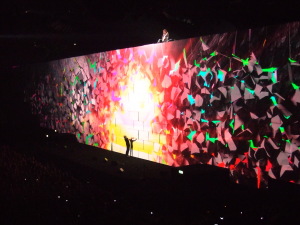
Can You Stand Up, I Do Believe It’s Working: Kilminster atop The Wall at the O2 in London, with Roger Waters onstage below.
Mettler: Speaking of huge moments — one of the biggest ones during the entire show is when you’re standing at the very top of the wall itself, doing the solo on “Comfortably Numb.” How do you compose a solo for one of the most iconic songs in the Pink Floyd canon?
Kilminster: I try to treat the music with the utmost respect and make the fans happy. If I were a fan, what would I want to hear? I’d want to hear that solo played as close to the original as possible, with as much energy, passion, soul, and emotion that I can squeeze into it.
Mettler: And there’s truly no hiding when you’re up there. Did you ever worry about falling off the wall?
Kilminster: Well, yes. (chuckles) There was no safety harness. I literally just stood on a platform that high in the air, which is kind of scary. It was very, very windy during the outdoor show we did in San Francisco [May 11, 2012] — the wind was whipping up off the Bay, and it was actually moving the wall. I could feel the wall moving and hitting the platform that I was standing on, trying to deal with 50,000 people looking at me while I’m trying to play the solo properly.
Mettler: Wow, no pressure on you there, Dave. What was your personal highlight of the show?
Kilminster: I tend to like that track, what is it… (sings) “dirty woman”…
Mettler: “Young Lust.”
Kilminster: Yeah. It’s a little bit more funky, a little bit more syncopated. That’s generally my taste. Obviously, “Comfortably Numb” is a highlight, but there’s so much pressure on it that my very favorite part of the show was always the very last chord of that solo. (laughs) The lift would go down and I could go, “Ahhhh.” And then I could enjoy the rest of the show.
Mettler: You’ve been able to play a good bit of the Pink Floyd catalog over the years, including all of The Dark Side of the Moon. What are your favorites?
Kilminster: “Any Colour You Like” was always nice. It’s slightly funky and messy, with all the chord progressions. And “Have a Cigar” — it’s kind of got that funky thing as well. I would have loved to have sung that one, since it’s right in my singing range. That’s the one thing I missed on The Wall tour, because I sang quite a lot on the Dark Side tour. But Roger wanted to replicate the whole bunch of singers who were on The Wall, so we did that with full backing vocalists and Robbie [Wyckoff], who was doing David [Gilmour]’s vocal parts. (pauses) It’s weird. It’s kind of like you’re living a dream on tours like these, really.
Mettler: And you get to play the soundtrack to that dream.
Kilminster: Yeah, yeah. I’ve just been so lucky. There isn’t a better job in the world for me, what I’ve been doing for the last 10 years. Obviously, I’d love to get out there and play live again. I don’t need stadiums and arenas and that stuff; I’m quite happy playing smaller places. Just playing music live — that’s where I’m happiest.
Mettler: Back to THE TRUTH. I really like the choir effect on “Stardust.”
Kilminster: Thanks. Yes, I did my “nun” impression on that — I was trying to sound like a group of nuns.
Mettler: Were you dressed the part when you did that one?
Kilminster: (laughs heartily) I’m not telling you. (laughs again)
Mettler: Tell me more about recording the string section. You said you wrote out the charts, and it was a four-piece.
Kilminster: Yes. Two violins, a viola, and a cello. They sat in a circle, as they usually do, with the music charts in front of them. It was four mikes pointing generally in their direction, and then there were two ambient mikes, which were sometimes used, and sometimes not. But the strings are on six of the eight tracks. I did a little promotional video, and you can see a little bit of the recording process. It was just a friend of mine, hanging around with a camera, and I figured it might be of use later on, so I’ve got tons of that footage — even the stuff in the nun’s getup. (MM laughs)
Mettler: I’m going to hold you to that, Dave. If we don’t see that footage, I’m going to expose it to the world.
Kilminster: (laughs heartily) I wanted to make my dirty habits.
Mettler: The Smoking Popes, so to speak. Like that Black Sabbath cover, or Van Halen. Sabbath during the Dio era, that is.
Kilminster: (laughs) Right, I think it was Black Sabbath. [Heaven and Hell, 1980, with female angels smoking on the cover.] The first time Van Halen were in England, they were supporting Black Sabbath. That was a good evening. (chuckles) I was living in Bristol at the time, so I saw them at the Bristol Colston Hall [May 26, 1978]. They also played Hammersmith Odeon.
Mettler: Besides Queen, what would you consider benchmark records for you from that era? Which ones do you think sound the best?
Kilminster: Pat Travers, Makin’ Magic (1977), that was another big album for me as well. Wired (1976), by Jeff Beck. Ohh —
Mettler: Yeah, even today, just seeing what he does onstage. You feel like you’re going to a clinic at every show.
Kilminster: The guy’s amazing. I went to see him at three shows, when he came over to England a couple of months ago. I don’t know how much longer he’s going to be doing this for. He’s one of — actually, he’s the only guitarist of that era who’s getting better, which is just phenomenal to me.
Mettler: Did you get a chance to speak with him? You must have crossed paths.
Kilminster: Yeah, I spoke with him. I felt really guilty, actually. (both laugh) The first time I ever met him, I was playing on the Dark Side tour with Roger, and we’d just finished playing Madison Square Garden [likely circa September 12-13, 2006]. And he came backstage. He’d been playing somewhere like B.B. Kings, for like a couple hundred people. So in that way, I felt very guilty.
I walked up to him, and the first thing he says to me is, “You bastard.” (MM laughs) I’m like, “What?” I wasn’t sure if he was kidding around. He said, “You! You stole my guitar tech.” The original tour with Roger was supposed to be 12 weeks. Tim Myer, my guitar tech, said he would do the Roger tour for 12 weeks, and then that was extended and became 2½ years, which then became, well … things got a little crazy. I don’t know, but he was my guitar tech throughout that whole period. Before that he’d worked with Jeff, so Jeff wasn’t impressed — in a lovely way.
Mettler: Being called a bastard by Jeff Beck — that’s almost a badge of honor, I think.
Kilminster: It is! It is, actually, I think it’s very cool. The most embarrassing thing happened when we were chatting backstage. I’m talking to one of my heroes, and I can see out of the corner of my eye someone is trying to push in on the conversation. I’m thinking, “Oh God, go away.” Eventually I look around, and this guy looks at us both and he goes (slight pause), “You’re Dave Kilminster!”
Mettler: (laughs heartily) Come on, how awesome is that? You’ve gotta love that!
Kilminster: It’s horrible! I’m serious! I thought, “Don’t you know who this is? Jesus!”
Mettler: And Jeff’s like, “You bastard — again!”
Kilminster: He is! Yeah! (chuckles heartily) But he’s amazing, totally amazing. As I said, he’s definitely someone to aspire to. He keeps on getting better every time I see him.
Mettler: The last outing I saw him was the tour with Brian Wilson [October 16, 2013, The Wellmont Theater, Montclair, New Jersey]. I think half of the audience didn’t understand what Jeff does.
Kilminster: Yeah, I thought it was an odd mixture. It reminded me of when Hendrix supported The Monkees.
Mettler: And we all saw how that turned out. (DK laughs) I think it’s more of a mutual respect thing between Brian and Jeff. See, now, I’m getting why the word TRUTH is in all caps on the name of your record. It was based on Jeff Beck, wasn’t it?
Kilminster: There was a little bit of inspiration there, for sure. Yeah, he’s got a few instrumental albums that I like.
Mettler: Are we talking Guitar Shop era, or…?
Kilminster: Guitar Shop (1989) was great. Jeff! (2003) is great too; that has some of the most ridiculous guitar sounds ever. And that’s just him sitting in the studio with a Marshall and cranking it. I even enjoyed some of the more electro stuff he did, where he played and then the producer added some sampled bits to put the songs together. Some of that was really well done. I didn’t like all of it, but some of the guitar sounds were just unbelievable.
Mettler: I do still like some of the stuff from Flash (1985), even if the keyboards sounds are a bit dated now.
Kilminster: Yes, ’80s keyboards still have a lot to answer for.
Mettler: Last thing, on the guitar front — on TRUTH, were you playing your classic “Rose,” or another guitar?
Kilminster: It’s a relative of the Rose — a Suhr, three-pickup. Because it’s a low-C tuning, I wanted to put heavier strings on it, so everything was written in this low-C tuning. And then for the solos, I thought, “Nah, I’m just going to stick to standard tuning.” Because it’s going to take too long to learn my square shapes and arpeggios and pentatonics, and whatever.
Mettler: Where’s the Mixolydian, Dave? Come on!
Kilminster: (laughs) I couldn’t even play a major scale in this new tuning! I bought all this new stuff, and it was so inspiring. I couldn’t stop writing. I was just recording new ideas as they came up. And I probably ended up with 45 hours worth of stuff. Then you have to sit down and listen to it all and find the bits you like and the bits that go with other bits. I just had way too much material. Once I have a break, I’ll start recording the next one. That will be in the bag, and if this one takes off, then I can go out on tour.
Tags: A Night at the Opera, And the Truth Shall Set You Free, Any Colour You Like, Comfortably Numb, Dave Kilminster, Guitar Shop, Have a Cigar, Jeff Beck, Killer Queen, Pink Floyd, Prog, quad, Queen, Roger Waters, Scarlet, Steven Wilson, Suhr, The Dark Side of the Moon, The Prophet's Song, The Wall, Truth, Wired, Wish You Were Here, Young Lust